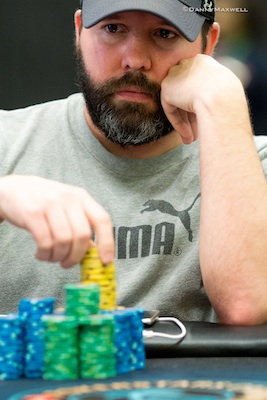
Covering live poker tournaments for a living affords me the opportunity to see countless thousands of hands played out, many of which offer interesting and potentially valuable insights into how players — both amateurs and professionals — play the game. In this ongoing series, I’ll highlight hands I’ve seen at the tournaments I’ve covered and see if we can glean anything useful from them.
The Scene
It’s back to the beautiful Caribbean for this week’s hand — although to be honest, the weather in the Bahamas was nothing to write home about at this year’s PokerStars Caribbean Adventure. We’re back for another hand from the $5,300 Main Event, this one from Day 5.
It’s one of the most tense times of the tournament as 10 players remain, with two tables of five on the final table bubble. The next player to go will get $51,260, while the remaining players will be squarely in the hunt for the EPT title and more than $800,000 sitting up top. It’s Level 26 (20,000/40,000/5,000) and the short-handed tables are seeing plenty of action.
The Action
After one fold, David Eldridge raised it up to 85,000 in the cutoff. Action folded to Timothy “T.J.” Ulmer (pictured above), who defended from the big blind. Both players started the hand with just over 2 million, with Ulmer covering.
The flop came ![]()
![]()
![]() , and Ulmer checked. Eldridge bet 70,000 and Ulmer called. Action went check-check on the
, and Ulmer checked. Eldridge bet 70,000 and Ulmer called. Action went check-check on the ![]() turn, then the
turn, then the ![]() river put a full house on the felt. Ulmer came out firing big with a bet of 500,000, and Eldridge thought long and hard before releasing his hand.
river put a full house on the felt. Ulmer came out firing big with a bet of 500,000, and Eldridge thought long and hard before releasing his hand.
Concept and Analysis
The hand begins with a raise from Eldridge, who is in the cutoff with a pretty deep stack. The five-handed nature of the table necessitated action, and Eldridge — very aggressive to begin with — doesn’t need much coaxing to mix it up.
Given all that, Ulmer should probably be defending a pretty big chunk of hands since Eldridge is going to open a lot in this spot. So when the flop comes ![]()
![]()
![]() , it’s very conceivable for either player to have improved. Ulmer decides to check-call the smallish continuation bet, then the turn gets checked though.
, it’s very conceivable for either player to have improved. Ulmer decides to check-call the smallish continuation bet, then the turn gets checked though.

When the river makes a full house on the board, Ulmer makes the interesting choice to lead out, but not with a standard-sized bet. He comes out with a big overbet of 500,000 into the pot of just over 350,000.
Remember that Eldridge checked back on the turn. That means his most likely holding is a hand with which he’s looking to pot control like ace-high or even an overpair, given that it’s pretty easy for Ulmer to have that beat with two pair on board.
The sizing of the bet is crucial here, because it gives Eldridge little room to maneuver. If Ulmer fired a big bet even around the size of the pot, he opens up for Eldridge the chance to bluff-raise him and steal the pot (if Ulmer is indeed bluffing). With this bet, though, even a min-raise would be more than half of Eldridge’s remaining chips. And calling to chop would still be a huge chunk of Eldridge’s stack.
Meanwhile if Ulmer does have it, he gets huge value if Eldridge decides to look him up with a pair in the hole or tries to call for a chop. Since Ulmer defended his big blind from a small raise at a short-handed table, he has plenty of hands including a seven in his range and this bet is very credible as a value bet with quads.
This was a very savvy use of an overbet by Ulmer in a spot where he gave his opponent very little wiggle room to do much of anything other than play his hand straight up. A normal-sized bet could have allowed Eldridge to take the initiative away, but instead his options were limited.
Want to stay atop all the latest in the poker world? If so, make sure to get PokerNews updates on your social media outlets. Follow us on Twitter and find us on both Facebook and Google+!
Top 10 NO deposit Bonus offers @

Read More... [Source: PokerNews]

No comments:
Post a Comment